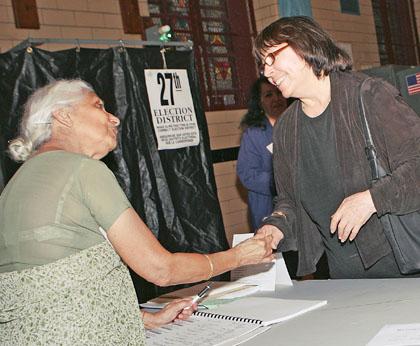By Stephen Stirling
Queens residents cut the cord that towed the Democratic Party line in last week’s primary elections, and while some say politics in the borough is in a state of upheaval, the long-dominant political machine says it is as strong as ever.
There were 10 primaries for City Council seats in Queens Sept. 15, six of which were competitive. As the dust settled on the night of the primary, four candidates backed by the Queens Democratic Organization — John Choe, Deirdre Feerick, Jerry Iannece and incumbent Councilwoman Helen Sears (D-Jackson Heights) — had been defeated — some badly — while a fifth, Councilman Tom White (D-South Ozone Park), led by a mere six votes.
The slate of Council winners in those races were propelled by varied sources.
Two, Yen Chou in Flushing and Kevin Kim in Bayside, were aided by an exceptionally high turnout among Asian-American voters exit polls show were primarily led by enthusiasm for Councilman John Liu’s (D-Flushing) city comptroller run.
Two others, Daniel Dromm in Jackson Heights and Jimmy Van Bramer in Sunnyside, were supported by the Working Families Party — a labor-backed political party that ran an aggressive, albeit legally disputed, get-out-the-vote campaign.
The final candidate, Jamaica-seat hopeful Lynn Nunes, is a political insurgent who ran a grassroots campaign against incumbent White in the southeast Queens community hit hard in recent years by the economic collapse and foreclosure crisis.
The primary also brought out only 11 percent of eligible voters, something Evan Stavisky, whose consulting firm the Parkside Group represented all 10 of the Queens Democratic organization-backed candidates, said could be to blame for the results.
“In a low turnout election anything can happen and usually does and this is an example of it,” he said. “In general, no matter what the circumstances are, you’re still better off being backed by the party than not.”
Stavisky pointed to the six contests Democratic Party-backed candidates had won and added “that’s still a batting average that would get you into the hall of fame first ballot.”
But Steven Choi, whose group YKASEC conducted exit polls alongside the Asian American Legal Defense Fund, said the victories of Chou and Kim indicated a larger movement is afoot.
“A lot of immigrant communities are growing quickly here and starting to organize these grassroots campaigns,” Choi said. “I believe that to a large extent this primary showed machine politics are not going to work here. I don’t think that the immigrant communities are as beholden to the Queens Democratic club.”
The primary season also saw the rise of the Working Families Party, which flexed its muscle as a major political player when its candidates for citywide races — Liu for comptroller and Councilman Bill di Blasio (D-Brooklyn) for public advocate — prevailed over the other two candidates and were headed to run-off elections Sept. 29.
Seven Council candidates supported by the WFP, including Dromm and Van Bramer, won their elections over incumbents or county organization-backed candidates.
“I think they’ve definitely emerged as a player and a rival in to any of the county organizations,” said Michael Krasner, a political science professor at Queens College.
Democratic sources say the party is uniting around its slate of candidates for the general election and contend the results do not represent a major hit for the party.
“It’s not like there’s been some big sea change,” one source said. “With a low turnout a couple hundred votes can make a difference. And in some of these cases, these guys have been active in the party for a while. Take Kevin Kim, he works for [U.S. Rep.] Gary Ackerman [D-Bayside]. It’s not like the party looks weak because he’s a Democratic insurgent.”
Krasner agreed that the Queens Democratic Party is not in complete disarray, but said the elections showed that hot-button issues like term limits can sway an election. The City Council voted in November to extend the number of terms a Council member can serve from two to three, a move that spawned much controversy in the months that followed.
“I think that’s a good part of what drove this,” he said. “The situation in the state Senate that I think has only served to further sour things … and sort of driven home the idea that the best thing you can do is throw the bums out and hope the new guy is better.”
Reach reporter Stephen Stirling by e-mail at sstirling@cnglocal.com or by phone at 718-229-0300, Ext. 138.



































